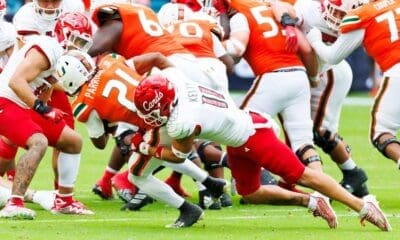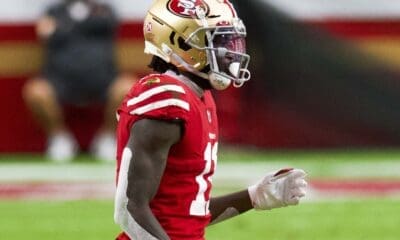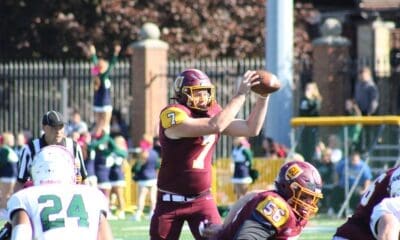Steelers News
Exclusive with former Steelers LB, Secret Service Agent Dave Hoffman

Our Steelers Interviews series continues, as Ron Lippock caught up with Dave Hoffman. Hoffman spent the 1993 season with the Steelers after being drafted by the Chicago Bears in 1992 out of Washington.
The linebacker played just one season in Pittsburgh before moving on to his life after football, where he became a Secret Service agent that helped protect two presidents and two vice presidents.
First, can you let us know how you got involved as member of the Secret Service?
Basically, going back to when I played at the University of Washington, I was blessed to play with a lot of great guys, But I had a number of injuries, and just like everyone else, you try and battle through them. Even as a rookie after I was drafted by Chicago, I had issues with my neck and back. In those days I had a bad foot and groin issues too.
But I loved playing. I loved being around the guys and loved contact. I loved to hit. As a linebacker I loved to learn the schemes and strategies too. When I was finally let go from my last team, the 49ers, I knew I was done after that. It was a short career — not what I had hoped for. But our bodies are mortal.
So what did you do after being released?
I wanted to do something where I could still use my head and body. I wanted to be part of a team and have challenges. I met some retired agents — FBI, Secret Service, CIA — and some great cops. I was back in Seattle when the opportunity came across my path. I knew it was time to get a real job. So I’ve been doing that for over 20 years now.
How hard was that post-NFL adjustment for you?
I talk about that now with guys sometimes. Whether you played for two minutes or 20 years, there’s a dark cloud – a funk you feel when you finish your career. Especially when guys don’t finish on their own terms, which is most of us.
I found myself struggling. It was like depression though I wouldn’t call it that. Just a feeling of loss and missing that intensity and brotherhood you only find in things like football, and I’m sure in the military. Probably moreso there since it’s life and death. It’s something you don’t realize until it’s gone. I experienced those feelings for a couple of years and kept it to myself. But when I talk to guys now I’ll say 100% of them experienced the same thing.
It’s not a slow stop.
That’s a great way to say it. No it’s not. It’s more like when someone hits the brakes and you fly through the windshield.
Stepping back, what happened that you found yourself in Pittsburgh as a rookie despite being drafted by the Bears?
I was actually let go. I think Mike Ditka’s scouts were the ones that were responsible for us even though it was Dave Wannstedt’s first year as the coach. I was fighting injuries. I could cover backs and tight ends, but playing the run was my forte. I had a great camp but I wasn’t a good fit and was let go.
I went to Seattle for a workout on a Tuesday and they told me they would sign me on Friday. But the next day I got a call from the Steelers. They told me they were sending me tickets and wanted me to fly out tomorrow. I asked them if this was a pack your bags thing or just a physical. When they told me to pack my bags, I went out.
At first I was just on the practice squad, but then I was activated. I wanted to work, so I took that job instead of waiting for Seattle. I have great memories of the organization, environment there, and of Bill Cowher.
The city and people were great. I loved to engage with them. I lived up the hill from the stadium in the Allegheny Center Apartments. I’d walk down to the stadium — sometimes I’d catch a ride with Kevin Greene — but usually I’d walk and just talk to the people there. My heart went out to the community. I really enjoyed their zest for life.
Anyone help mentor you as a rookie in Pittsburgh?
I learned a lot just from talking to the guys. And from Dom Capers. They had a great staff and I knew guys like Chad Brown and the rest of the Colorado Buffalos there like Ariel Solomon because we played them every year in college.
I became good friends with Steve Avery and Jeff Zgonina. I was always a sponge. I soaked up everything. I had a head for schemes and learned how to be ready so i was quick to the ball.
I struggled with injuries. I had a pretty nasty groin injury and the vets told me not to come back until I was 100%. But through my own insecurity, I rushed back, I was afraid I wouldn’t be re-signed if i didn’t get out there quickly. I still feel that groin on cold weather days. I just wasn’t going to be of any use after that injury.
Any memories that stand out to you of your time there?
I remember when Cowher finally had to let me go. Here was this great big, strong guy in front of me, his eyes watering up. It wasn’t easy for him. I was almost comforting him during the talk, He was a unique man. He had a good Christian heart.
After Chicago, nothing against the people there, but Pittsburgh was a family. Just the way things were run and the way everyone was connected. It was just very different. I missed playing, but i missed that environment even more.
Any fun memories you can recall?
I remember having a good time, having fun doing wrestling talk with some of the guys. Macho Man Savage was my guy. Kevin Greene, Jeff, a lot of us did it. Of course, you do it for too long you start to lose your voice. And if you’re a linebacker who’s job it is to call signals and audibles, that can be rough. We’d continue doing it from the locker room to the on-field drills. It probably wasn’t the smartest thing to do, but that’s a middle linebacker for you!
Any thoughts on the way the game has changed since you played?
I appreciate the concern and them trying to protect guys. As someone with frequent headaches and migraines due to neck tension from injuries and a bulging disc, I do appreciate that. I do think the rules can be overplayed sometimes, the way they call them.
Back in my day, I’d get praised by Dick Vermeil and Brent Musberger for the same hits they call out guys for now. America loves its warriors and the barbaric part of the game. That’s why so many enjoy it. It’s very unique, the American way we play and appreciate the inflicting of damage on each other. Not the cheap shots, just hitting each other in the mouth. I bet all those recipients of those hard hits the announcers are now calling names would say the hits were just great hits.
I understand it’s more important than ever to use good technique. We used our bodies as weapons back in the day. It’s a weird way to play, but we enjoyed it. Now it’s modified. The rules are good, they just need to make sure they aren’t overdone.














